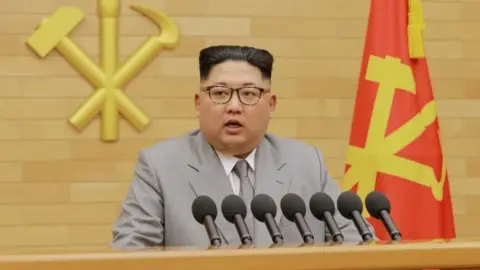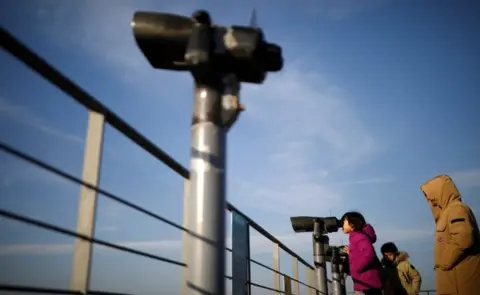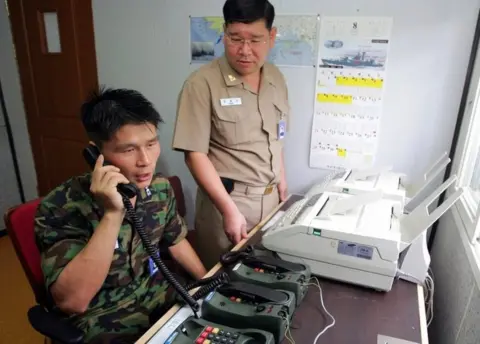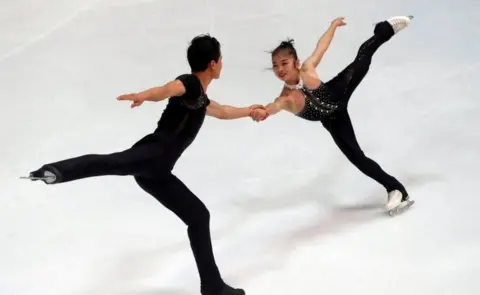Will North Korea compete in Winter Olympics?
 Reuters
ReutersNorth and South Korea both seem keen for the North to take part in the 2018 Winter Olympic Games in the South. But there are still hurdles to overcome before North Korean skaters can take to the ice in Pyeongchang, writes North Korean leadership specialist Michael Madden.
Next week, one day after Kim Jong-un's birthday, there is a very good chance that representatives of North and South Korea's unification departments will meet in the truce village in Panmunjom.
Their aim will be to discuss whether the Democratic People's Republic of Korea (DPRK), the official name of North Korea, sends a delegation to the 2018 Winter Olympics, taking place in February in Pyeongchang, South Korea.
While their attendance wouldn't resolve the long-standing crisis on the Korean peninsula it would, as both sides have said, be a gesture of peace.
But before we start waiting for North Korean athletes (two figure skaters, so far) and its VIP delegation (which might include Kim Yo-jong, the younger sister and close aide of the North Korean leader) to appear in Pyeongchang, and before they even meet on 9 January, the two Koreas will need to participate in a series of careful interactions, and there's much that could yet go wrong.
How did the proposed meeting come about?
The fact that South Korean President Moon Jae-in even proposed the meeting, in response to remarks Kim Jong-un made during his New Year's Day address, has sent some analysts into making overwrought and heavy handed pronouncements.
They're talking about appeasement of the North, of Pyongyang using its potential participation in the Olympics as a way to extract concessions on issues of geostrategic concern, and to give voice to a "sky is falling" perspective that Pyongyang is attempting to drive a wedge in the South Korean-US alliance.
 Reuters
ReutersBut it's important to note that Mr Moon's proposal and Mr Kim's remarks about the Olympics were the result of two secret meetings between South and North Korean sports officials, which took place in China in late December.
The two Koreas agreed to participate in sports exchanges during 2018.
From the North Korean side, a vice minister of athletics was sent to interact with his South Korean counterparts, who may or may not have been acting on President Moon's instructions. Seoul and Pyongyang appeared to have leveraged this secret contact and a general agreement about sports exchanges to a potential meeting on 9 January.
Based on this, and both leaders' statements, it's clear there's a high degree of enthusiasm for making this happen, and both sides are proceeding cautiously.
So what happens next?
The first step will be to have telephone conversations to plan the delegation and agenda for next week's meeting.
One hang up on this was that the North has not been answering the inter-Korea hotline when the South has dialled.
But Kim Jong-un has now ordered the reopening the North's part of the line, and the two sides have had their first direct communication in two years.
 AFP/Getty Images
AFP/Getty ImagesDuring the next few days, representatives of the two Koreas will discuss the agenda and attendees of the potential meeting to discuss the Olympics.
Even if that goes well, two things could yet prevent that 9 January meeting from taking place.
First, a DPRK representative might attempt to introduce other items that are not on the agreed agenda, slowing down the process.
Secondly, if an agenda is agreed, the meeting might be thrown out because of protocol disputes.
In the past, there was disagreement between the two Koreas over the appropriate ranks of counterpart officials leading to a break off in contact.
The protocol issue might sound like a petty dispute to outside observers.
However, from the perspective of the North Koreans, they will want interlocutors who have the authority to make a binding decision, pending President Moon's approval, about the North's participation.
From the perspective of the South Koreans, they want DPRK counterparts who have some decision-making autonomy, and if the North makes a tentative agreement, can get the message directly to Kim Jong-un and be able to reliably advocate for it in Pyongyang's political culture (senior North Korean officials, it should be noted, have different perspectives on policy issues and debate them out amongst themselves).
What else could go wrong?
If there is no upstaging the agenda nor an argument about the officials participating, and the Koreas do meet, the next potential trap is that they may not be able to come to an agreement.
 Reuters
ReutersThe North might attempt to extract some type of concession from South Korea, either a request for assistance or removing sanctions.
The South, for its part, might place restrictions on the number of cheerleaders who can attend the games, or refuse to allow additional North Korean athletes to participate.
So far, the DPRK only has two athletes who qualify for the Olympics, but President Moon has some flexibility on letting in more athletes.
What's Kim Jong-un's motive?
Some outside analysts think that Pyongyang is using its potential participation in the Winter Olympics as a back door to undermine the international community's sanctions and diplomatic efforts intended to stop the DPRK from testing its ballistic missiles and expanding its inventory of nuclear weapons.
This is myopic and misleading.
This was, arguably, a tactic employed under late DPRK leader Kim Jong-il, but Kim Jong-un is a different leader than his father. While Kim Jong-un will certainly order continued drills of its ballistic missiles, he also wishes to see a reduction in tensions between the two Koreas and avoid any unnecessary panic about the next North Korean nuclear crisis.
Pyongyang policymakers also labour under no illusions that President Moon can prevent upcoming South Korea-US military exercises. They might ask the South to cancel the exercises, but also understand the reality that these events are planned long in advance and that Seoul does have some input as to what pieces of military equipment end up being deployed.
There is also no reason to think that once the DPRK does conduct a missile drill or even tests a nuclear device (these things, given the advanced state of the North's weapons of mass destruction programme, are a matter of when and not if) that the South Korean government won't upbraid the DPRK or even advocate for additional sanctions at the UN Security Council.
But if the North does participate in the Olympics and manages to keep its lines of communication open this reduces the likelihood of miscalculation (on both sides) which could escalate into a military conflict.
What about Moon Jae-in?
President Moon Jae-in has inaccurately been labelled desperate or naive. He has much more experience dealing with North Korea than his armchair critics.
President Moon's proposal for North Korean participation in the Winter Olympics is an incremental step that might eventually lead to further, more substantive interactions between the North and South.
For Kim Jong-un and Moon Jae-in, and to those who follow the peninsula closely, DPRK participation will be an excellent public relations opportunity, and also cause a temporary pressure drop in neighbourhood geopolitical tensions.
The 2016 selfie of North Korean and South Korean gymnasts was a viral moment that showed that athletes can put aside the political differences and provocative activities of their respective governments and compete in an atmosphere of respect and love of sport.
To those critiquing President Moon's proposal, one needs ask: do we want the Koreans competing in sports and talking to one another, or do we want them threatening to kill each other?
Michael Madden is Visiting Scholar of the US Korea Institute at SAIS-Johns Hopkins University and Director of NK Leadership Watch, an affiliate of 38 North.
Additional reporting by Sierra Madden, analyst on the North Korean Cabinet and Government for NK Leadership Watch.
